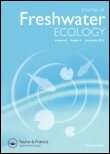
JOURNAL OF FRESHWATER ECOLOGY
Scope & Guideline
Cultivating a global dialogue on aquatic sustainability.
Introduction
Aims and Scopes
- Freshwater Biodiversity and Community Structure:
Research on the diversity of freshwater organisms, including fish, macroinvertebrates, and phytoplankton, and their community dynamics in response to environmental changes. - Ecosystem Function and Services:
Studies examining the roles of freshwater ecosystems in providing services such as water purification, nutrient cycling, and habitat provision, highlighting the ecological functions of different species. - Impact of Anthropogenic Factors:
Investigations into how human activities, such as pollution, habitat alteration, and climate change, affect freshwater ecosystems and the species that inhabit them. - Invasive Species and Management Strategies:
Research focused on the ecological impacts of invasive species in freshwater systems and the development of management strategies to mitigate their effects. - Ecological Monitoring and Assessment:
Use of innovative methods, including environmental DNA (eDNA) and biogeochemical assessments, for monitoring freshwater ecosystems and assessing their health. - Hydrological Dynamics and Water Quality:
Studies exploring the relationships between hydrological changes, water quality parameters, and their effects on aquatic life and ecosystem function.
Trending and Emerging
- Environmental DNA (eDNA) Applications:
A significant increase in studies utilizing eDNA for biodiversity assessments and monitoring has emerged, allowing for more efficient and comprehensive evaluations of freshwater communities. - Climate Change Impacts on Freshwater Systems:
Research addressing the effects of climate change on freshwater ecosystems, including temperature effects, hydrological alterations, and species responses, has gained prominence. - Eutrophication and Nutrient Management:
There is a growing focus on the causes and management of eutrophication in freshwater systems, reflecting concerns over nutrient pollution and its ecological consequences. - Restoration Ecology and Management Practices:
Emerging themes include the restoration of degraded freshwater habitats and the effectiveness of various management practices aimed at enhancing ecosystem resilience. - Interactions between Invasive Species and Native Biodiversity:
Increased research on the complex interactions between invasive species and native communities, focusing on ecological impacts and management strategies. - Microplastics and Pollutant Studies:
An increasing trend towards investigating the effects of microplastics and other contaminants on freshwater ecosystems, reflecting global environmental concerns.
Declining or Waning
- Traditional Aquatic Plant Studies:
Research focusing solely on the taxonomy and morphology of aquatic plants has decreased, potentially due to a shift towards understanding their ecological roles and interactions within ecosystems. - Static Models of Biodiversity:
There has been a waning interest in traditional static models of biodiversity assessment. The journal now emphasizes dynamic, multifactorial approaches that consider temporal changes and interactions. - Single-Species Management Approaches:
Research concentrating on single-species management has become less prominent as the focus has shifted towards ecosystem-level management and understanding species interactions. - Localized Studies without Broader Implications:
Studies that do not connect local findings to broader ecological or management implications are appearing less frequently, indicating a trend towards more integrative research. - Basic Water Quality Assessments:
Basic assessments of water quality parameters, without deeper ecological analysis, are declining in favor of studies linking water quality to biological outcomes and ecosystem health.
Similar Journals
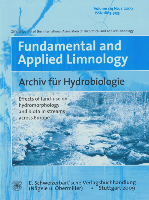
Fundamental and Applied Limnology
Navigating Freshwater Science: From Fundamental Studies to Practical SolutionsFundamental and Applied Limnology is an esteemed academic journal dedicated to the exploration of freshwater ecosystems, bridging the gap between fundamental research and practical applications. Published by E Schweizerbart'sche Verlagsbuchhandlung in Germany, this journal has been a vital resource in the fields of aquatic science and ecology since its inception in 2007. With its ISSN 1863-9135 and E-ISSN 1863-9135, it provides a platform for researchers to disseminate significant findings related to limnology, contributing to a rich understanding of freshwater biodiversity, water quality, and ecological interactions. Although currently rated in the Q3 quartile for aquatic sciences and ecology as per the 2023 rankings, it remains a valuable outlet for interdisciplinary research and practical insights, facilitating critical advancements in environmental management. Open access options enhance its visibility and accessibility, making it indispensable for researchers, professionals, and students alike who are committed to advancing the scholarship in freshwater studies. Engaging with this journal not only opens doors to the latest research findings but also fosters collaboration and innovation in the ecological community.
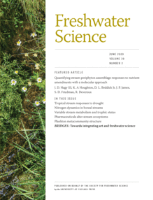
Freshwater Science
Exploring the Depths of Freshwater EcologyFreshwater Science is a pivotal journal published by the University of Chicago Press, dedicated to advancing the understanding of freshwater ecosystems and their biodiversity. With an ISSN of 2161-9549 and an E-ISSN of 2161-9565, this journal has been a vital resource in the fields of Aquatic Science and Ecology, consistently ranked in the Q2 quartile across multiple categories in 2023. The journal encapsulates rigorous research and innovative studies aimed at addressing the ecological dynamics of freshwater environments from 2012 to 2024. Researchers and practitioners benefit from its open access options, which enhance the dissemination of knowledge while contributing to a better understanding of aquatic systems. With Scopus rankings that place it in the top 30% of its fields, Freshwater Science plays an influential role in fostering scientific dialogue and collaboration among professionals, making it an essential publication for anyone invested in freshwater conservation, management, and ecological impact.

LAKE AND RESERVOIR MANAGEMENT
Exploring the intersection of ecology and water resource management.LAKE AND RESERVOIR MANAGEMENT is a premier academic journal published by Taylor & Francis Inc, providing a dedicated platform for the dissemination of high-quality research and innovations in the field of aquatic management. With an ISSN of 1040-2381 and an E-ISSN of 2151-5530, the journal encompasses a broad spectrum of topics related to the sustainable management and ecological assessment of lakes and reservoirs. As an essential resource for researchers, professionals, and students involved in environmental science, hydrology, and water resource management, the journal aims to address critical issues such as water quality, ecosystem services, and the impact of human activities on aquatic systems. Additionally, the journal promotes interdisciplinary approaches that foster collaborative solutions for effective management of aquatic resources. Although it currently does not offer open access, LAKE AND RESERVOIR MANAGEMENT remains influential in shaping policies and practices within the field, making it a vital read for anyone dedicated to advancing knowledge and practice in aquatic ecosystem management.
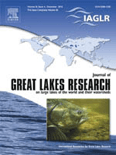
JOURNAL OF GREAT LAKES RESEARCH
Elevating Aquatic Research for Global ImpactJOURNAL OF GREAT LAKES RESEARCH is a prestigious academic journal published by Elsevier Science Ltd, focused on the vital field of aquatic sciences and ecology. With a long-standing history since its inception in 1975, this journal proudly ranks in the Q1 quartile across multiple categories, including Aquatic Science and Ecology, as of 2023, reflecting its significant contribution to the scientific community. The journal's impact is underscored by its impressive Scopus rankings, placing it within the top percentile of scholarly publications in related disciplines. Although it operates under a subscription model, its influence extends globally, serving as a critical resource for researchers and professionals dedicated to understanding the Great Lakes ecosystem and its broader ecological implications. As it converges into its future publications through 2024, JOURNAL OF GREAT LAKES RESEARCH remains an essential platform for innovative research that shapes environmental policy and promotes sustainable practices in aquatic environments.

LIMNOLOGY
Unveiling the Secrets of Freshwater SystemsLIMNOLOGY, published by SPRINGER JAPAN KK, serves as a premier platform for the dissemination of high-quality research in the fields of aquatic science, ecology, and water science and technology. With an ISSN of 1439-8621 and an E-ISSN of 1439-863X, this respected journal has consistently maintained a Q2 ranking in its respective categories as of 2023, reflecting its impact and relevance in the academic community. Operating from its base in Tokyo, Japan, LIMNOLOGY engages a diverse audience of researchers, professionals, and students who are focused on advancing knowledge related to freshwater systems and their ecological health. This journal covers a wide range of topics within its scope from the year 2000 to 2024, highlighting essential studies that contribute to both theoretical and applied aspects of limnology. Although this journal is not open access, its rigorous peer-reviewed articles are crucial for driving innovation and fostering dialogue among scientists and environmentalists dedicated to understanding and preserving water ecosystems.
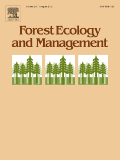
FOREST ECOLOGY AND MANAGEMENT
Advancing Sustainable Forest PracticesFOREST ECOLOGY AND MANAGEMENT is a premier peer-reviewed journal dedicated to the integral study of forest ecosystems and their management, published by Elsevier in the Netherlands. With an impactful presence in the field, this journal boasts a prestigious Q1 ranking in multiple categories, including Forestry, Management, Monitoring, Policy and Law, and Nature and Landscape Conservation as of 2023. It addresses key issues relevant to sustainable forest practices, conservation strategies, and environmental monitoring, making it a vital resource for researchers, practitioners, and policymakers alike. The journal is indexed with an impressive Scopus rank, placing it among the top tier of titles in Agricultural and Biological Sciences and Environmental Science. While it does not offer Open Access options, its rigorous review process and high visibility make it essential for those seeking to stay abreast of the latest findings and trends in forest ecology and management. Published continuously since 1976, FOREST ECOLOGY AND MANAGEMENT aims to foster interdisciplinary collaboration and advance knowledge critical to the stewardship of forest resources in an ever-changing global landscape.

Journal of Oceanology and Limnology
Unveiling the Mysteries of Water WorldsJournal of Oceanology and Limnology, published by SCIENCE PRESS, is a premier academic journal dedicated to advancing the fields of oceanography and limnology. With an ISSN of 2096-5508 and E-ISSN 2523-3521, this journal has emerged as a vital resource since its inception, aiming to disseminate cutting-edge research and comprehensive studies on aquatic environments. Based in China and indexed with notable rankings in Scopus, including a Q2 category in Oceanography and a Q3 category in Water Science and Technology, this journal significantly contributes to knowledge in these crucial scientific disciplines. The H-index for the journal is currently being established, reflecting its evolving impact within the academic community. Moreover, the open access model promotes wider dissemination, ensuring that research findings are accessible to a global audience. Covering a diverse range of topics from ecosystem health to climate impact on water bodies, the Journal of Oceanology and Limnology aspires to foster interdisciplinary dialogue and innovation among researchers, professionals, and students engaged in understanding and preserving aquatic life.

International Journal of Limnology
Transforming Aquatic Science through Open AccessThe International Journal of Limnology, published by EDP SCIENCES S A, is a cutting-edge journal dedicated to the field of aquatic sciences, with a strong emphasis on limnology—the study of inland waters. Headquartered in France, the journal serves as a vital resource for scholars and practitioners alike, aiming to advance the understanding of freshwater ecosystems and their management. With an e-ISSN of 2823-1465 and classified within the Q3 category of the 2023 Aquatic Science quartiles, it occupies a significant niche in academic research, ranking 150 out of 247 in Scopus listings. The journal’s open access policy ensures that research findings are widely disseminated, facilitating collaboration and innovation across global aquatic science communities. Published continuously from 2022 to 2024, the International Journal of Limnology aspires to contribute to sustainable practices and enhance ecological understanding, making it an essential publication for researchers, professionals, and students committed to the stewardship of aquatic resources.

Inland Waters
Fostering Collaboration for Healthy Inland WatersInland Waters, published by TAYLOR & FRANCIS LTD, stands as a prestigious scholarly journal dedicated to the critical examination of freshwater ecosystems and their management. With an ISSN of 2044-2041 and an E-ISSN of 2044-205X, this journal boasts a remarkable Q1 ranking in both Aquatic Science and Water Science and Technology for 2023, reflecting its significant impact in the field. Researchers and professionals can benefit from its comprehensive coverage of cutting-edge research, methodological advancements, and policy implications concerning inland waters. Committed to disseminating valuable knowledge in a vital area of environmental science, Inland Waters aims to foster collaboration and promote innovative solutions for sustainable water management practices. As it continues through its converged years from 2012 to 2024, the journal remains an essential resource for those dedicated to advancing our understanding and stewardship of freshwater environments worldwide.
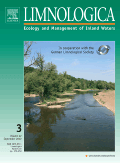
LIMNOLOGICA
Pioneering Studies in Aquatic Ecosystem HealthLIMNOLOGICA is a prestigious academic journal dedicated to the field of aquatic sciences, published by Elsevier GmbH, a leading global publisher known for its commitment to disseminating high-quality research. With an ISSN of 0075-9511 and an E-ISSN of 1873-5851, the journal has established itself as a vital source of scholarly articles, reviews, and case studies since its inception in 1974. Operating from its base in Munich, Germany, LIMNOLOGICA provides a forum for researchers and professionals to explore contemporary issues in limnology, ensuring important contributions to the understanding of freshwater ecosystems. Recognized in the 2023 rankings, the journal boasts a respectable Q2 quartile in Aquatic Science, ranking #98 out of 247 in Scopus, placing it in the 60th percentile among its peers. While currently not an open-access journal, it continues to attract a wide readership by providing insights into ecological processes, conservation strategies, and the impacts of anthropogenic changes on freshwater environments. This makes LIMNOLOGICA an essential resource for anyone engaged in aquatic research, conservation efforts, and environmental policy development.